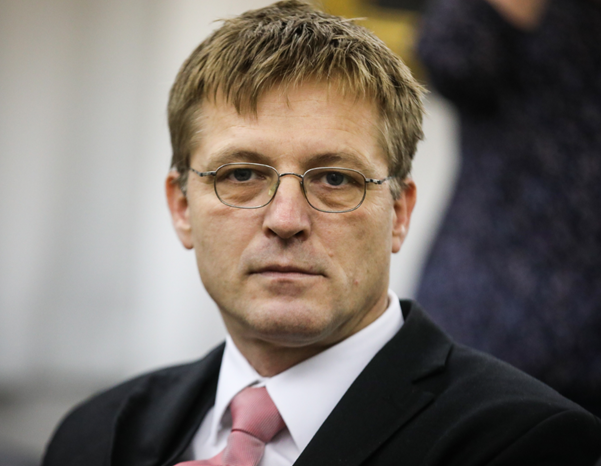By: Ana Hribar / Nova24tv
The term verbal tort refers to Article 133 of the Criminal Code of the Socialist Federal Republic of Yugoslavia (Hate propaganda). It was a crime against the foundations of the socialist self-governing social order and security of the SFRY. Anyone who acted against the communist regime in any way, verbally or in writing, could also be punished with imprisonment. Today, Janez Janša is being sent to prison for his words. Because he did not let the state-owned television station publicly slander him and call his party, the Slovenian Democratic Party (Slovenska demokratska stranka – SDS), a fascist party. Do we not live in a democratic country? And what is even more insane is that the initiative to sanction his “words” came from journalists, the people who should be the first to defend “freedom of speech.”
In his article published on the Siol web portal, journalist and editor-in-chief Peter Jančič also wondered how it is possible for journalists to support the sanctioning of freedom of speech. Due to a verbal offence that came after he responded to the public slander of the Slovenian Democratic Party, which was described as fascist on the state-owned Radio-Television Slovenia. On Twitter, he told the editor Mojca Pašek Šetinc and journalist Eugenija Carl that they are Milan’s cheap, discarded prostitutes.
According to Jančič, the verdict is even more embarrassing, given that it was initiated by journalists, who should have been the first to oppose the regulation of words being prosecuted through criminal proceedings, but in this case, it was actually the other way around, as they even celebrated the verdict. As stated in the introduction, a conviction of a verbal tort Is a remnant of communist times, when your words could cause you to end up in jail or even worse.
If it is Janša, he should go to prison; if it is not him, then it is fine
In a case like this, normal countries would sanction the media or individuals and have them pay compensation for “the bad words” about Milan Kučan and the editors from the state-owned television; however, such protection of the elite is not uncommon. However, after Janša’s verdict, many journalists celebrated, including the self-proclaimed “independent journalist” Mojca Pašek Šetinc, who, conveniently, also officially became an MP at around that time. This hatred towards Janez Janša that some editors and journalists are displaying is so strong that it deprives them of the opportunity to make clear-headed judgments, and they are simply ignoring the warnings of international journalistic organisations about what is wrong with our legal system.
The journalists are even praising the fact that verbal tort is now punishable, but only if the person accused is Janez Janša, because when someone else uses hate speech in public, they never speak up. Jančič cited the case of Ludvik Tomšič, who publicly shouted that “Janša needs to be killed right now,” immediately after taking over the power.
Jančič then also summed up the second “victory” of the new coalition, which deprived the largest opposition party, the SDS, of the leadership position of the Public Finance Control Commission, a function assigned to them by the parliament’s rules of procedure, and assigned it to the smaller opposition party, the New Slovenia party (Nova Slovenija – NSi). This is supposed to help them reach their goal – creating a conflict between the opposition parties, NSi and SDS. With this “gift,” the coalition also took a step forward with the old, dirty and fraudulent way of governing, which in the past was also typical for party representatives in the RTV Programme Council and the Supervisory Board. “Instead of SDS candidates, the previous centre-left coalition decided to choose representatives from the smaller parties: NSi, the Social Democrats (SD), the List of Marjan Šarec (LMŠ), thus achieving that the largest opposition party (and the largest party since the 2018 elections) then had no representatives. However, the smaller parties had some. When the SDS returned to power and changed this, meaning that the smaller parties did not have as many representatives, the left described it as an abuse of power, and today, they are continuing to do the same thing themselves,” Jančič wrote.
After an extremely quick takeover of power, Golob is experimenting with the healthcare system
The dispute is centred around public finances, which also led to the collapse of Marjan Šarec’s government after it could not withstand the pressure due to blackmail from Luka Mesec from the Left party (Levica). The first person to resign was the Minister of Health, Aleš Šabeder; after him, it was the Minister of Finance, Andrej Bertoncelj, and then the former Prime Minister, Šarec himself, also gave up. However, everything that luckily did not happen back then might happen now, under the leadership of Robert Golob, who will most likely take power a week after being elected Prime Minister, which is three days earlier than Janša, who only took power so quickly due to the impending epidemic. Unlike them, Marjan Šarec needed way longer to take power, but there were other reasons for it.

